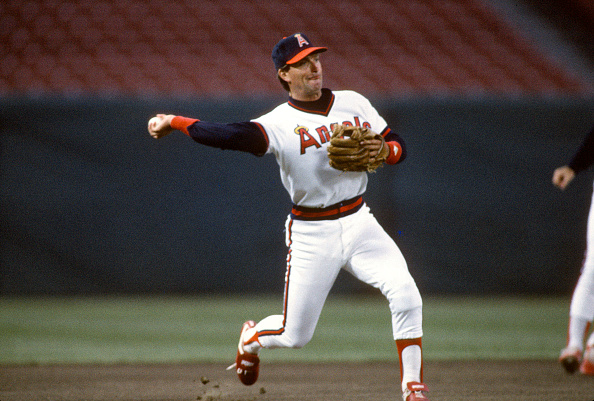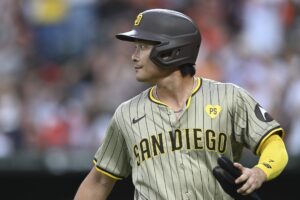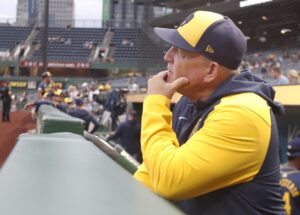Doug DeCinces is not a name that’s on the tip of every baseball fan’s tongue. Indeed, even this writer had barely heard of him until doing research for this piece. However, during the late 1970s and throughout the 1980s, DeCinces was relatively well known. During his career, he only made one All-Star appearance. At the same time, it does not reflect his type of player. He retired after 15 years in the big leagues. Over that time, he swatted 237 home runs, drove 879 runs, and put up over 1,500 hits. He had a career OPS+ of a very solid 115 and recorded over 2,500 total bases. In short, Doug DeCinces was a very good player and one of the best bats in the league during his prime.
So, you’re probably asking yourself why he’s showing up in a series of unlikely seasons. Simply this: beginning in 1982, DeCinces was on the downslope of a roller coaster that followed him throughout his career. He had a fair final season with the Baltimore Orioles in 1981, batting .263 with 13 homers and 55 RBI in 100 games. Nothing from that season nor the previous two rivalled his previous successes. So, in January of 1982, he and Jeff Schneider were the ones dealt to the California Angels for right fielder Dan Ford. Little did the Orioles know it, but they had traded away a future MVP candidate.
Doug DeCinces: An Odd Path to the Majors
Doug DeCinces was one of those players who got drafted twice. In 1969, the San Diego Padres took him in the 18th round. After returning to college in 1970, the Orioles picked him in the third round. He had big shoes to fill, namely, Hall of Famer and Oriole legend Brooks Robinson. It took him a while to find his footing, but when he did, things rapidly took a turn for the better. In 1978, he slashed .286/.346/.526 with 28 homers, 80 RBI, and 146 hits in 142 games. Unfortunately, his next few seasons saw a significant downgrade, especially in the power department. From 1979-1981, he combined for 45 home runs. His OPS+ sank as well. Then he was shipped to the Angels, where he had the best year of his career almost immediately.
1982 California Angels
For the Angels as a whole, 1982 was a return to glory. After a mediocre, strike-shortened 1981 (which saw them go 51-59), they improved to 93-69. They took home AL West gold by three games after a tense race with the Kansas City Royals. The Angels were guided by a terrific balance between offense and pitching. In terms of lumber, the attack was none other than future Hall of Famers Reggie Jackson and Rod Carew, along with DeCinces. Staff ace Geoff Zahn won 18 games on the mound, and fellow starter Mike Witt posted a 116 ERA+. They could have a shaky bullpen at times. However, Andy Hassler and Bruce Kison helped to maintain order (12-6 combined record). All of this helped push the Angels to an excellent season.
A Mediocre Beginning
The year began slowly for DeCinces. He went hitless in his first nine plate appearances. However, on April 8, he found his footing with a two-homer game against the Oakland Athletics. Over the next 11 games, he only went hitless once. During this span, he hit .342 with 15 hits, nine RBI, and a 1.129 OPS. He cooled off towards the end of the month. He still managed to end April with a slash line of .247/.330/.442.
A decided consistency marked the next two months. From May through June, Doug DeCinces set himself up for what was to be a blazing end to the summer. He slashed .260/.310/.439 with an OPS of .749 for the two months. In terms of fortune, it shared almost equal billing with his actual batting average (.263 BABIP). His power stroke was still somewhat lacking, as he only put up six home runs during this span. That brought him to nine for the season by the end of June. It all happened in 273 at-bats, meaning he was homering once every 30.33 at-bats. This stat might be confusing for someone who wound up with 30 at the end of the season. The rest of the summer saw Doug DeCinces meet the top of the aforementioned roller coaster.
A Two-Month Blaze for DeCinces
In July and August, DeCinces flipped an offensive switch. Over that time, he slashed a blistering .371/.446/.731 with an OPS of 1.177 in 49 games. He clobbered 16 homers in 186 at-bats. That’s a homer to at-bat ratio of 11.63, which is smaller than his previous effort. Not only was his power stroke back, but he was also a legitimate threat in production. He scored 38 runs and drove in 39. His patience at the plate was still something of a concern, as he had a walk rate of a smidge over 11% during this time. However, he managed to post a strikeout rate of around 10%, which is excellent for someone relying so much on power.
Another interesting thing about this stretch is some of his advanced stats. Over these two months, Doug DeCinces put up a wRC+ of 217. By comparison, during his mediocre start, he had a wRC+ of 99. That’s an improvement of 118, which is mind-boggling. His wOBA during that cumbersome start still sat at a very serviceable .324. The offensive hot stretch brought an increase of 181 points (.505). Everything about July and August went right for Doug DeCinces. It also created a legitimate MVP candidate where, previously, there had been a good third baseman.
Postseason & Summary
September was excellent as well. In it, DeCinces slashed .293/.366/.509 with an .875 OPS to help the Angels to a 17-13 mark and a postseason berth. They lost the ALCS to the upstart Milwaukee Brewers. However, it wasn’t for lack of production from their sudden household name. During the series, DeCinces slashed .316/.350/.421 with an OPS of .771. Though he never went deep, he did have six hits, two doubles, and five runs scored. He collected eight bases and only struck out five times in the five-game set.
So ends the story of a high point in a career roller coaster. DeCinces continued to have more success in California, but never to the point of his 1982 campaign. He made the All-Star team in 1983 and finished 11th in MVP voting in 1986. Yet, two months in 1982 truly defined his time with the Angels. Roller coaster or not, DeCinces became invaluable and helped guide that team to the playoffs.
Main Image
Players mentioned:
Doug DeCinces, Jeff Schneider, Dan Ford, Brooks Robinson, Rod Carew, Geoff Zahn, Mike Witt, Andy Hassler, Bruce Kison






